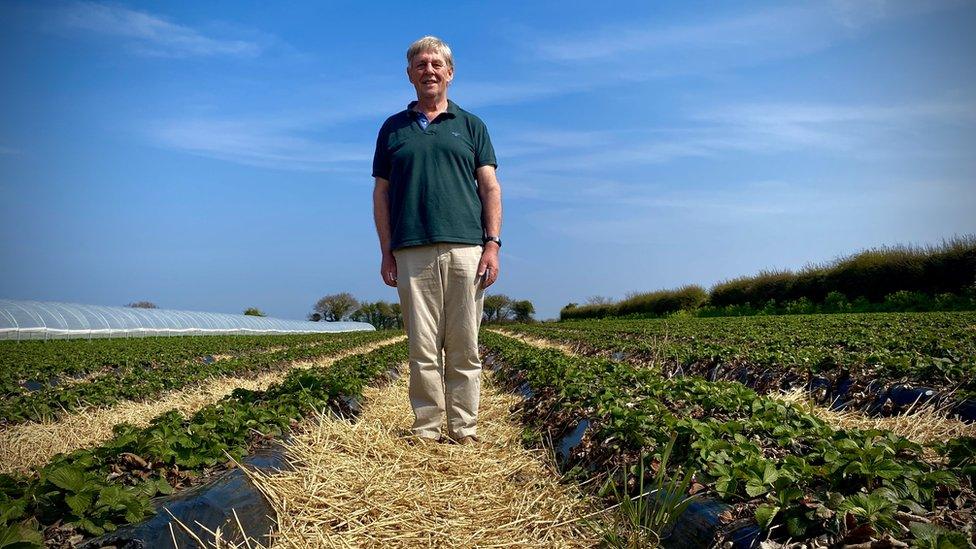Farm shops are essential for viability, say farmers
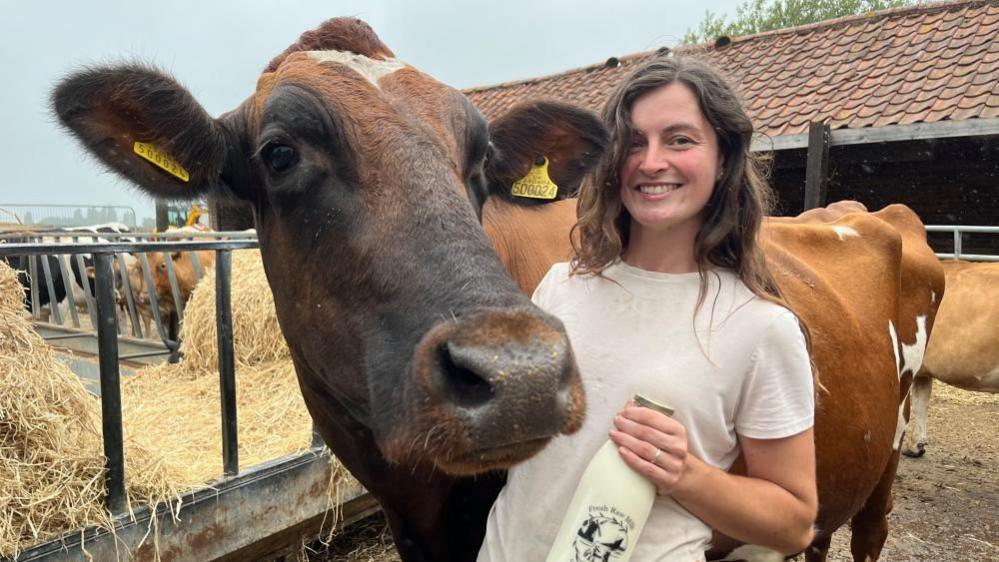
Erin Shreeve says Norfolk County Council gave the couple an opportunity to fulfil their dreams as farmers
- Published
A group of farmers have said that direct sales to the public were crucial to the viability of their businesses.
Katrina and Richard Hirst from Ormesby St Margaret, Norfolk, Emma and Charlie Tacon from Rollesby, near Great Yarmouth, and Erin and Robin Shreeve from Mautby, Norfolk, each own farm shops as well as produce crops and rear livestock.
They said that building shops enabled them to control prices and engage with customers over the process of producing locally grown and high-welfare foods, which has given them a greater income than working with large-scale markets.
Mr Hirst said his diversified businesses yield a greater profit than the arable side of his farm.
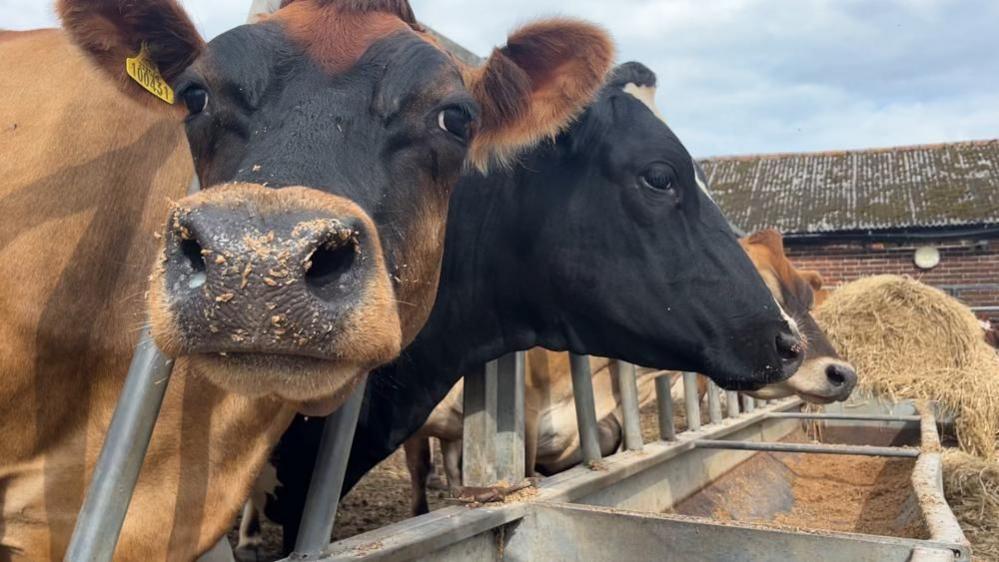
Cows at Upper Wood Farm in Mautby are fed on a diet of which 95% has been grown on the farm
The Shreeves took up tenancy of a Norfolk County Council-owned county farm in Mautby in 2012.
The farm comprises of a cottage, buildings and 52 hectares (128 acres), which includes marshland to graze cattle and to grow 95% of the feed required for their micro dairy herd.
Ms Shreeve said: "Without county farms, the reality is we wouldn't be farming, or if we were, it would be for someone else doing what they want.
"So having a council farm ourselves has given us the opportunity to do everything we wanted to do in farming and be our own bosses.
"We wouldn't be doing the dairy if we weren't selling [direct] from the farm, not just because of the raw milk but because of the scale that we can do it in.
"We have 12 cows to milk which to us is amazing as four years ago we started with two dairy cows.
"Now, we are doing cream, butter and ice cream and all these different things which gives us the opportunity to have these lovely animals."
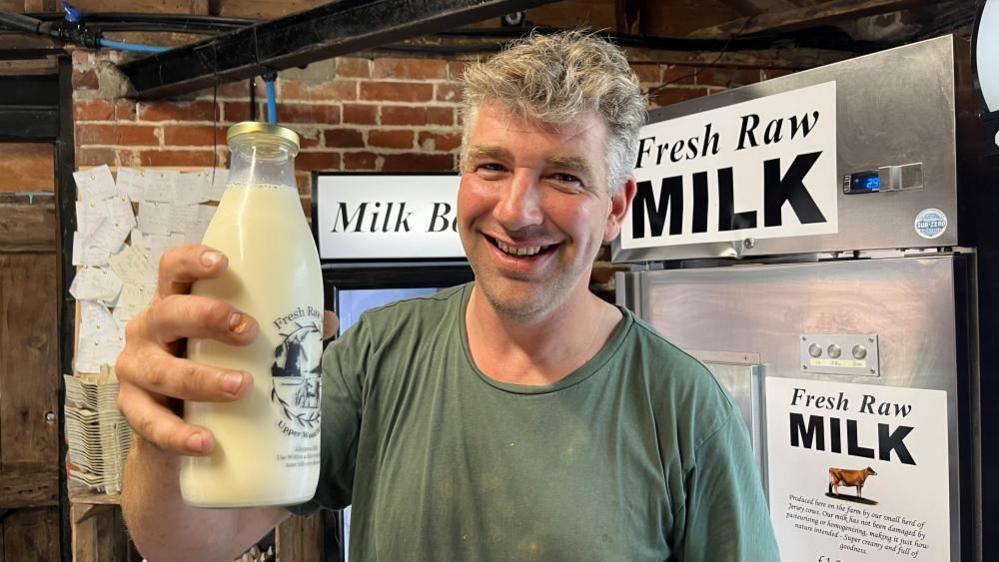
The Shreeve farm graze 150 sheep and 160 lambs at foot
The couple, who have two daughters, aged three and five, also rent 31 hectares (76 acres) at Nova Scotia Farm in Caister, Norfolk, where Mr Shreeve began his farming career.
The couple graze 150 sheep and 160 lambs at foot, under a sheep-proof solar farm.
Mr Shreeve added: "All the beef in [the farm shop] is from our own cattle, all of which are fed our own food.
"We grow it on the farm, we process it on the farm and that's something we are desperately proud of.
"It's so sustainable, there's no food miles in the meat whatsoever; it's food feet!"
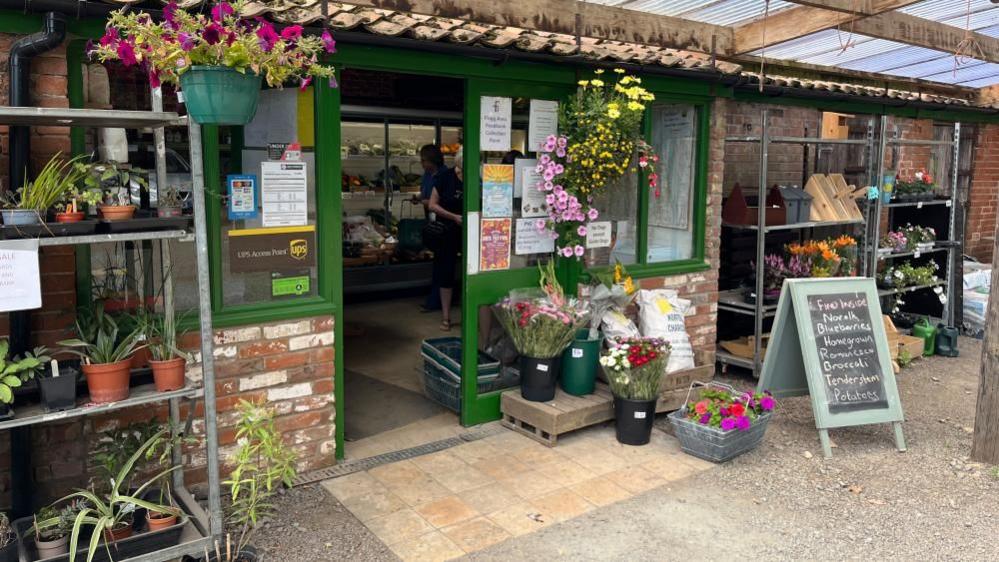
The Tacons' farm shop allows the couple to control prices in a way they could not if they supplied supermarkets
Emma and Charlie Tacon grow soft fruits, green vegetables and root crops on their 80 hectares (198 acres) farm in Rollesby.
They sell direct through their farm shop but also supply other nearby farm shops and larger stores, such as Roys of Wroxham and the East of England Co-op.
Ms Tacon said if they focused on bulk sales of arable crops, she and her husband would have to take on second jobs to earn enough money to live comfortably.
She added: "We would certainly need jobs off the farm if we grew commodity crops. It wouldn't be enough to sustain us.
"We're a relatively small farm so in order to make a sufficient income we had to supply something a bit different, rather than just wheat and sugar beet."
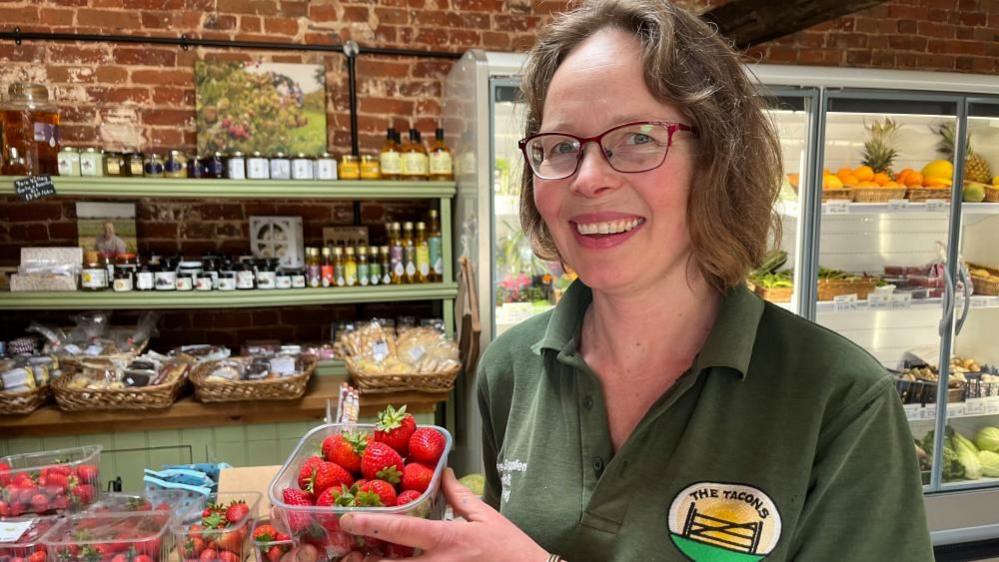
Ms Tacon says without the farm shop she would have had to have got a second job
She said running their farm was labour-intensive, owing to the picking and packing of perishable crops, and it employs around eight people year round and additional seasonal staff.
"In order to retain some control over our prices we actively chose not to supply the big supermarkets, but keep control over our end price by supplying other local farm shops, our own farm shop and larger regional businesses such as Roys or East of England Co-op, where we can have a fair discussion about price.
"We've always got that peace of mind that we can have a sensible conversation with our customers, be that the farm shop down the road or the East of England Co-op, who understand and want our business to survive, so we work together.
"While the price has to be sensible so that the customer is happy, we can work together to achieve our common goals."
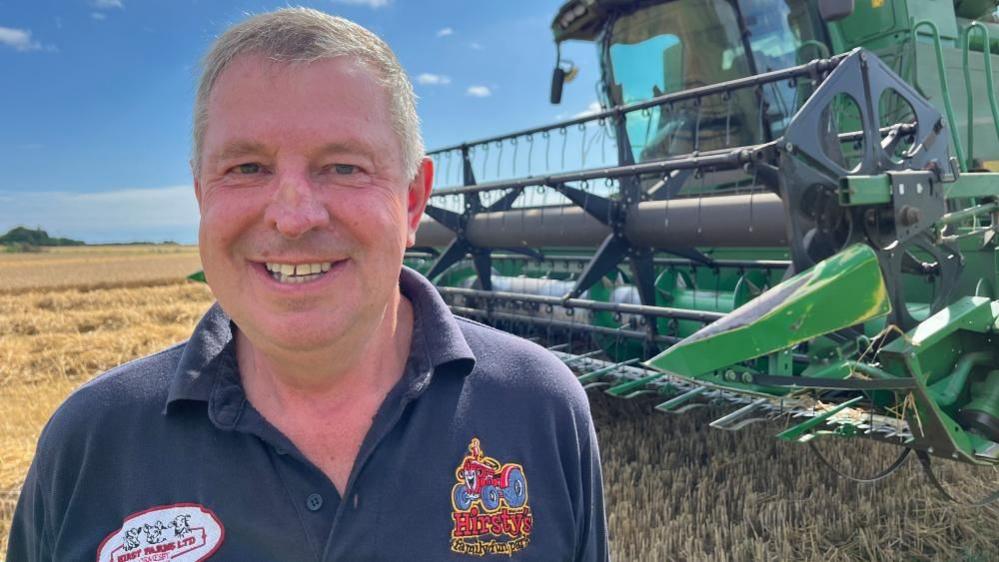
Richard Hirst says his farm shop makes more money than the arable side of his farming income
Richard Hirst at Ormesby Farms 400 hectares (988 acres), which produces cereals, sugar beet, potatoes and salads. He also rears sheep, cattle and pigs.
He has diversified the business and now operates a horse riding livery, a farm shop and café as well as a farming-themed tourist attraction.
He said: "The fun park we started in 2007 or 2008 when crop prices were very low and we wanted to do something different.
"We have a captive audience from tourists here, so we thought we'd give that a go and it's been a very successful diversification.
"We started serving our own beef and lamb burgers at the fun park but there was a lot of meat we were leaving with the butcher, so we thought we might as well start selling that ourselves, so we started the farm shop and then developed the café."
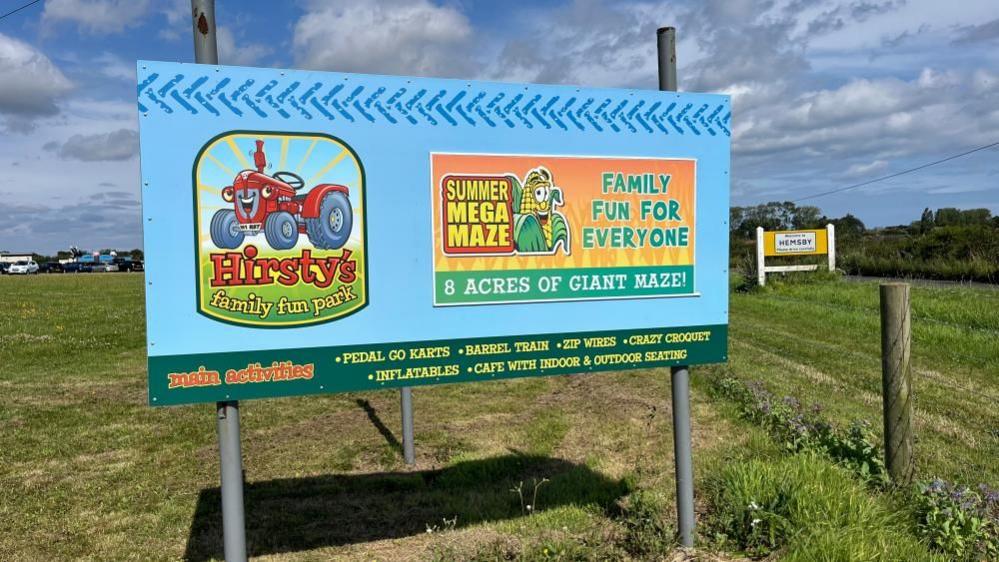
Hirsty's Family Fun Park and Mega Maze was set up in 2007 as a way of generating more income
He added: "The turnover of those three [diversified businesses] is more than the arable farm business.
"We are also employing a lot more people now. When I came back to the farm in the early 1980s we had ten people working on the farm.
"We are now down to one [on the farm] with my son Robert and I, but [at peak season] we've got 30 people on the books with the shop, café and fun park, so the balance has changed completely as to where the employment is now."
Follow Norfolk news on BBC Sounds, Facebook, external, Instagram, external and X, external.
Related topics
- Published23 July 2024
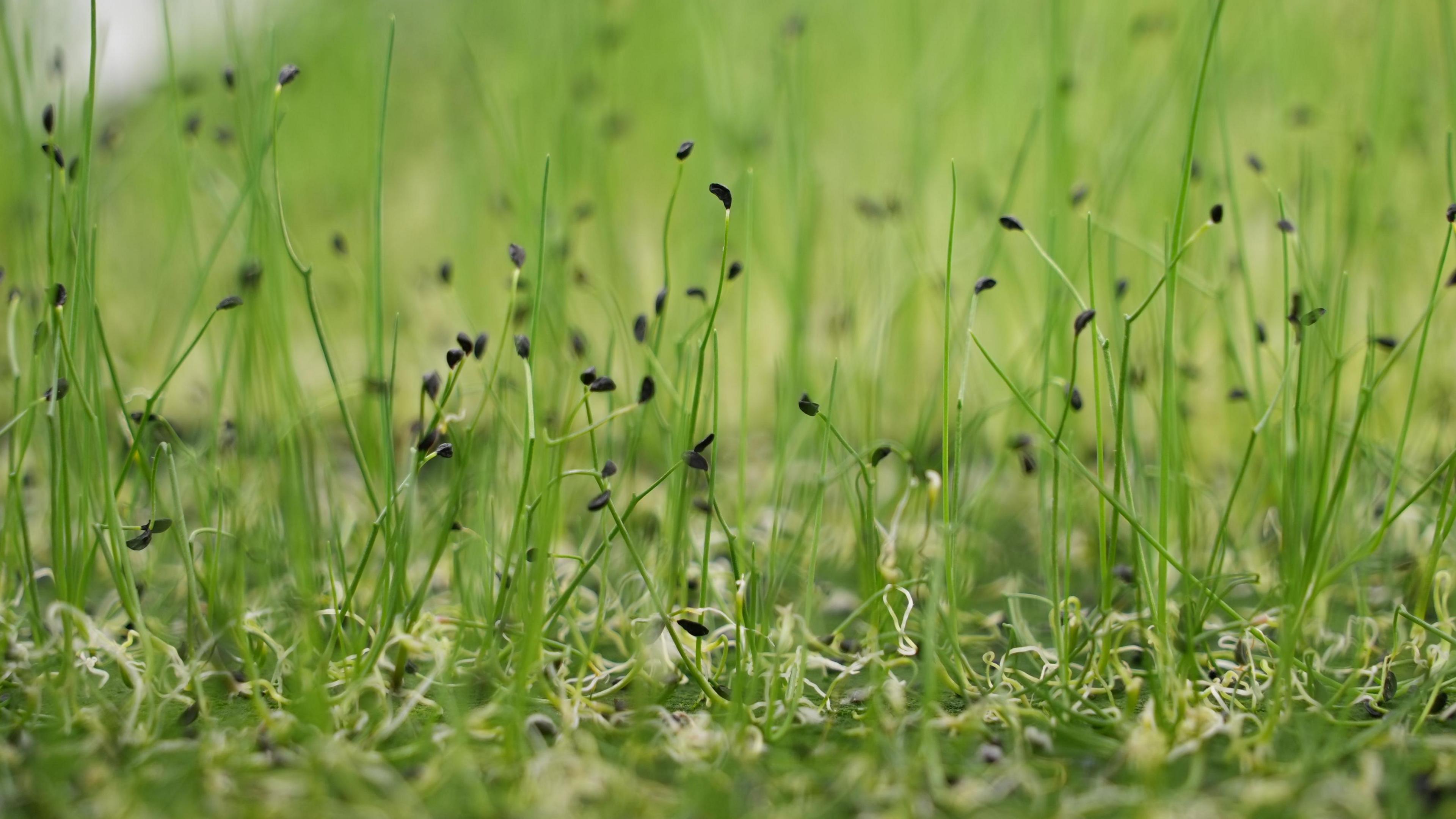
- Published21 April 2021
